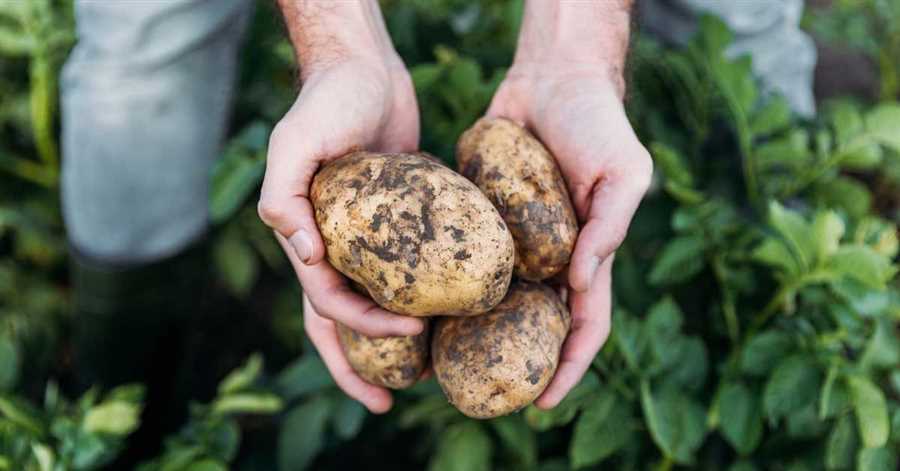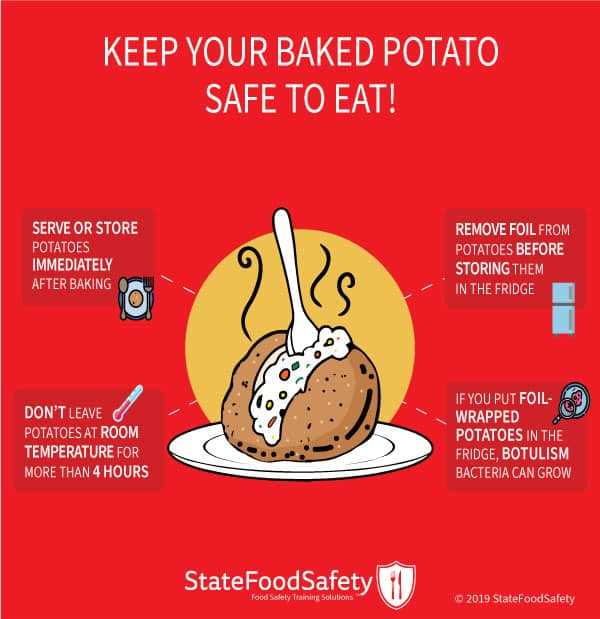



One common question that arises when it comes to food safety is whether it is safe to leave cooked potatoes out overnight. It is important to properly store and handle cooked potatoes, as leaving them out for too long can lead to the growth of harmful bacteria.
When cooked potatoes are left at room temperature for an extended period of time, conditions become ideal for bacterial growth. Bacteria such as Clostridium botulinum, which causes botulism, can multiply rapidly if potatoes are not stored properly.
To prevent the growth of harmful bacteria, it is recommended to store cooked potatoes in airtight containers in the refrigerator. This helps to maintain a safe temperature and slows down the growth of bacteria. Additionally, if you plan on storing cooked potatoes for longer than two hours, it is best to place them in the refrigerator within that time frame.
In conclusion, it is not safe to leave cooked potatoes out overnight. It is important to handle and store cooked potatoes properly to prevent the growth of harmful bacteria and ensure food safety.
The Safety of Leaving Cooked Potatoes Out Overnight
Leaving cooked potatoes out overnight can be a potential health risk. Potatoes, when cooked, become a suitable environment for the growth of bacteria, including harmful ones like Clostridium botulinum.
Clostridium botulinum is a type of bacteria that can produce a toxin known as botulinum toxin. This toxin is responsible for causing a severe illness called botulism, which can lead to paralysis and even death in some cases.
The Danger Zone
Leaving cooked potatoes out overnight allows them to enter the temperature danger zone, which is between 40°F (4°C) and 140°F (60°C). This temperature range allows bacteria to multiply rapidly, increasing the risk of foodborne illnesses.
Potatoes in particular are a concern because they have a high moisture content, which creates a favorable environment for bacterial growth. Additionally, their low acidity level makes them a neutral pH food, further promoting bacterial growth.
The Importance of Proper Storage
To ensure the safety of cooked potatoes, it is essential to store them properly. After cooking, potatoes should be cooled quickly and refrigerated within two hours. Storing them at temperatures below 40°F (4°C) slows down bacterial growth and helps maintain the quality and freshness of the food.
If you accidentally leave cooked potatoes out overnight, it is best to discard them rather than risking foodborne illness. Reheating them may kill some bacteria, but it may not eliminate all the toxins produced by the bacteria.
In conclusion, leaving cooked potatoes out overnight is not recommended due to the potential health risks associated with bacterial growth and the formation of toxins. It is important to practice safe food handling and storage techniques to prevent foodborne illnesses.
Understanding the Risks
Leaving cooked potatoes out overnight can pose some health risks. Bacteria thrives at room temperature, and if left out for an extended period of time, bacteria can multiply rapidly on cooked potatoes, potentially causing foodborne illnesses.
1. Bacterial Growth

When cooked potatoes are left at room temperature, they provide an ideal environment for bacteria to grow and multiply. Bacteria, such as Clostridium botulinum and Staphylococcus aureus, can produce toxins that can make you sick. These toxins cannot be destroyed by reheating the potatoes.
Clostridium botulinum is a bacterium that can produce a neurotoxin called botulinum toxin, which causes botulism. Symptoms of botulism include weakness, difficulty swallowing, blurred vision, and muscle paralysis.
Staphylococcus aureus is a bacterium that can produce toxins that cause food poisoning symptoms, such as nausea, vomiting, abdominal pain, and diarrhea.
2. Foodborne Illnesses
If you consume cooked potatoes that have been left out overnight, you may be at risk of developing foodborne illnesses. These illnesses can range from mild to severe, depending on the type of bacteria present and the amount consumed.
Common symptoms of foodborne illnesses include nausea, vomiting, diarrhea, abdominal pain, and fever. In severe cases, foodborne illnesses can lead to dehydration, hospitalization, and even death.
It is important to note that foodborne illnesses can affect anyone, but certain individuals, such as young children, elderly adults, pregnant women, and individuals with weakened immune systems, are more susceptible to severe symptoms and complications.
To prevent the risk of foodborne illnesses, it is best to follow proper food safety practices. Cooked potatoes should be promptly refrigerated and consumed within a reasonable time frame. If you are unsure about the safety of cooked potatoes left out overnight, it is best to discard them to avoid any potential health risks.
Food Safety Guidelines
When it comes to food safety, it is important to follow certain guidelines to prevent foodborne illnesses caused by bacteria or other contaminants. Here are some important tips:
- Keep it clean: Always wash your hands thoroughly with soap and water before handling food. Additionally, make sure to clean all utensils, cutting boards, and surfaces that come into contact with food.
- Separate raw and cooked foods: To avoid cross-contamination, keep raw meats, poultry, seafood, and eggs separate from cooked foods and ready-to-eat foods.
- Cook thoroughly: Ensure that foods, especially meats, poultry, and seafood, are cooked to the correct internal temperature to kill any harmful bacteria. Use a food thermometer to check the temperature.
- Refrigerate promptly: Perishable foods should be refrigerated or frozen within two hours of cooking or being left at room temperature. This helps prevent bacterial growth.
- Handle leftovers properly: Leftovers should be stored in airtight containers and refrigerated promptly. They can be safely consumed within 3-4 days when reheated to the proper temperature.
- Do not leave cooked potatoes out overnight: Cooked potatoes, like other perishable foods, should not be left out at room temperature for more than two hours. Bacteria can grow rapidly in this environment, increasing the risk of foodborne illness.
By following these food safety guidelines, you can help ensure that your meals are safe to eat and reduce the risk of foodborne illnesses. It is important to always practice good food hygiene and make informed decisions when it comes to storing, preparing, and consuming food.
Proper Storage Practices
When it comes to storing cooked potatoes, following proper storage practices is essential to ensure their safety and quality. Here are some guidelines to keep in mind:
1. Refrigeration: Cooked potatoes should be refrigerated promptly, preferably within 2 hours of cooking. This helps to slow down bacterial growth and maintain the potatoes’ freshness.
2. Proper packaging: Transfer the cooked potatoes into airtight containers or sealable bags before refrigerating. This prevents the potatoes from absorbing odors and helps to retain their moisture.
3. Temperature: Set your refrigerator temperature to below 4°C (40°F). Keeping the fridge at a lower temperature helps to extend the shelf life of cooked potatoes and minimizes the risk of bacterial growth.
4. Shelf life: Cooked potatoes can typically be stored in the refrigerator for up to 4 days. After this point, they may start to lose their texture and flavor.
5. Freezing: To further extend the shelf life, cooked potatoes can be frozen. It is recommended to divide them into smaller portions before freezing to allow for easier thawing and reheating.
6. Thawing and reheating: When thawing and reheating cooked potatoes, ensure they reach a temperature of at least 74°C (165°F) to destroy any harmful bacteria that may have developed.
7. Discard if unsure: If you are uncertain about the safety or quality of cooked potatoes that have been left out overnight, it is best to err on the side of caution and discard them. Consuming spoiled food can lead to foodborne illnesses.
By following these proper storage practices, you can help ensure that your cooked potatoes remain safe and delicious for longer periods.
Reheating Cooked Potatoes
Reheating leftover cooked potatoes can be done safely if proper precautions are taken. It is important to store cooked potatoes properly and reheat them to a safe temperature to avoid the risk of foodborne illness.
Storing Cooked Potatoes

After cooking potatoes, it is important to cool them down quickly and store them properly. Leftover cooked potatoes should be stored in an airtight container and kept in the refrigerator. This will help prevent the growth of bacteria that can cause food poisoning.
Reheating Cooked Potatoes
When reheating cooked potatoes, it is important to do so thoroughly to kill any bacteria that may have grown during storage. The recommended method is to heat them in an oven or microwave until they reach an internal temperature of at least 165°F (75°C).
It is not recommended to reheat cooked potatoes in a slow cooker or at low temperatures, as it may not reach a high enough temperature to kill harmful bacteria. Additionally, reheating potatoes on the stovetop may lead to uneven heating and a risk of burning.
Best Practices for Reheating Cooked Potatoes
Here are some best practices to follow when reheating cooked potatoes:
| 1. | Before reheating, check the potatoes for any signs of spoilage, such as an off smell, mold, or discoloration. If they don’t look or smell right, it is best to discard them. |
| 2. | If reheating in an oven, preheat it to 350°F (175°C) and spread the potatoes in a single layer on a baking sheet. This will help ensure even heating. |
| 3. | If reheating in a microwave, place the potatoes in a microwave-safe dish and cover them to retain moisture. Stir or rotate the potatoes halfway through the reheating process to promote even heating. |
| 4. | Use a food thermometer to check the internal temperature of the potatoes. They should reach a minimum of 165°F (75°C) before being considered safe to eat. |
| 5. | Discard any reheated potatoes that have been left at room temperature for more than two hours. |
By following these guidelines, you can safely reheat cooked potatoes and enjoy them without the risk of foodborne illness.
Questions and answers
Is it safe to leave cooked potatoes out overnight?
No, it is not safe to leave cooked potatoes out overnight. They should be refrigerated within two hours of cooking to prevent the growth of bacteria.
I accidentally left cooked potatoes out overnight. Can I still eat them?
No, it is not recommended to eat cooked potatoes that have been left out overnight. Bacteria can grow at room temperature and cause foodborne illnesses. It’s better to discard them to avoid any potential risks.
What if I left cooked potatoes out for a few hours? Can I still consume them?
If the cooked potatoes were left out for a few hours, they should be safe to eat if they have been stored in a cool and dry environment. However, it is always better to refrigerate them as soon as possible to prevent any bacterial growth.
How long can cooked potatoes be left out at room temperature before they become unsafe to eat?
Cooked potatoes should not be left out at room temperature for more than 2 hours. After this time, bacteria can start to multiply, increasing the risk of foodborne illnesses. It is best to refrigerate them within this time frame to maintain their safety.






